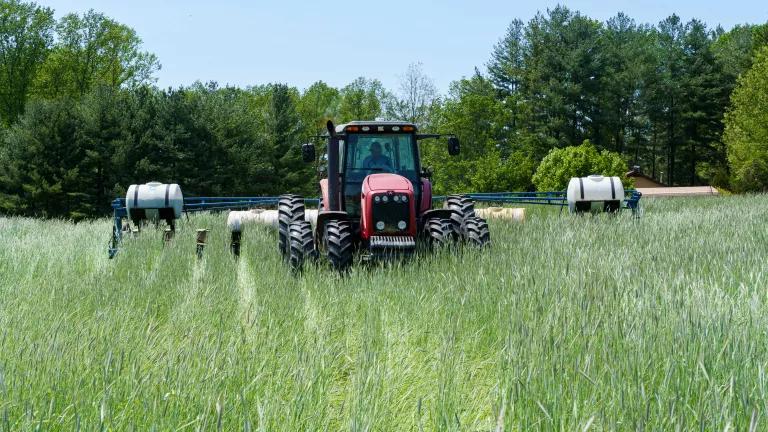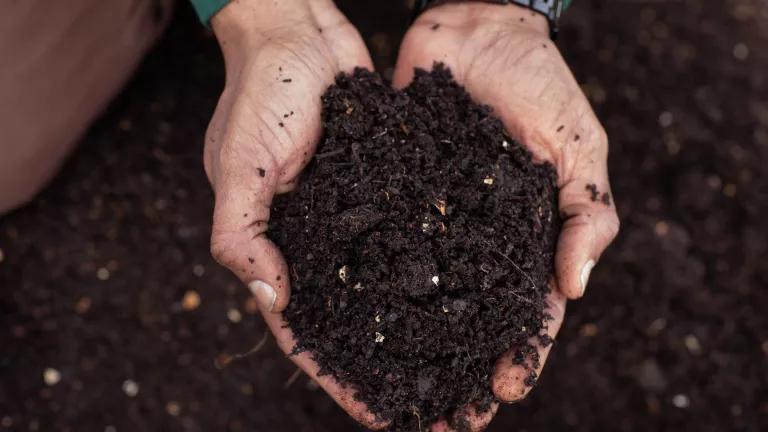After Life-Threatening Superbug Infection, a Missouri Hog Farmer Starts Over--Without Antibiotics
NRDC’s annual Growing Green Awards ceremony last week kicked off with an indoor farmer’s market, where I got to taste about ten spectacular artisanal cheeses, organic strawberries from Swanton Berry Farm, and many other locally grown and locally produced foods. The care, passion and expertise that goes into these foods—as well as the minimal distances they have to travel—helps make them delicious.
And because they are sustainably produced, these foods also provide benefits even if you never have a chance to eat them—benefits to the soil, the water, the air, and even your health. This is particularly true in the case of hog farmer Russ Kremer, recipient of this year’s Food Producer award. His decision to raise his pigs without antibiotics is helping ensure that these life-saving medicines remain effective for all of us, if and when we need them.
In the spring of 1989, Kremer was gored in the knee by one of his Yorkshire boars, a muscular animal with the approximate shape of a locomotive and the weight of a good-sized grizzly. Kremer, a fifth generation hog farmer, didn’t bother going to the doctor for a few weeks, figuring it was a routine injury.
In fact, it nearly killed him. And the experience led him to reinvent his livestock operation from the ground up.
Kremer’s leg swelled to twice its normal size, and the infection didn’t respond to penicillin. Courses of streptomycin, erythromycin, amoxicillin and tetracycline also failed to have any effect. For two months the infection raged unchecked, and Kremer’s life hung in the balance. Kremer began to suspect that he himself was partly responsible. He was infected with a superbug, and he had picked it up from his own pigs. Pigs that got the bug because of the way he was raising them.
“I never expected the pigs I raised—or most importantly, how I raised [my pigs]—to send me to the hospital, fighting for my life,” said Kremer. Tests showed that he was indeed infected with the same drug-resistant strep that plagued his animals, and he was eventually cured with a potent cephalosporin, the only antibiotic able to combat strep on his farm. After his recovery, Kremer vowed to go back to the start. He began raising fewer, free-roaming, drug-free pigs, building on techniques his grandfather used to create a healthier, more sustainable hog farm, and helping other independent farmers do the same.
As a young man, Kremer had helped convert his family farm into a modern, conventional hog farm, employing the latest animal husbandry technologies and practices he had learned in college. To concentrate and expand production, he and his father built confinement buildings, dug out waste lagoons and pits. They increased the size of their herd and started weaning pigs early. They also added small doses of antibiotics and other additives to their pigs’ feed, with an eye to accelerating growth and to protect against infections associated with the animals’ crowded, dirty, stressful living conditions.
This practice is common on factory farms. So common, in fact, that the vast majority of all antibiotics sold in the United States go to animals—and mostly to animals that aren’t even sick. As a result of this overuse, “superbugs”—bacteria that are resistant to treatment by antibiotics--are on the rise. Scientists have determined that these bacteria can escape livestock operations, in the air, soil, and water, and on farm and meat processing workers. As superbugs spread out and exchange genetic material with other bacteria, antibiotic resistance spreads as well. When these bacteria make people sick, whether through a wound like Kremer’s, or something as seemingly routine as a child’s ear infection, the illness can be much more difficult to treat because standard antibiotics are no longer effective. Leading health and medical organizations have sounded the alarm about antibiotic abuse in the livestock industry, but the Food and Drug Administration (FDA), the agency responsible for regulating antibiotic use in livestock, has failed to take decisive action.
NRDC is engaged in a legal battle with the FDA to demand that the agency do its job and step up to protect the public from this health threat. Despite being under court order to act, the FDA continues to drag its feet, and antibiotics continue to be misused on factory farms. While we continue to push the FDA to move forward with binding regulations to stop the misuse of antibiotics, the pioneering work and advocacy of farmers like Kremer is an absolutely critical part of efforts to preserve the effectiveness of antibiotics. It’s also a critical part of the broader movement to revamp America’s food system.
More than 90 percent of pork produced in the United States comes from factory farms. Farms like Kremer’s, where the pigs are free-roaming and drug-free, and stay healthy through proper nutrition and humane living conditions, are a minority—-but they’re not alone. Kremer created a cooperative of sustainable hog farmers in the Ozark region, helping them pool their resources and develop relationships with big buyers such as Whole Foods, Costco, and Chipotle. Kremer’s work is helping to build an alternative food system, proving that antibiotic abuse is not a necessary part of livestock rearing, and that there is a broad market for pork raised without antibiotics.
We are all fortunate that Russ Kremer has a passion for pigs, and has dedicated his life to making hog farming healthier and more sustainable. We honor people like him each year at the Growing Green Awards--people who remind us that access to healthy food should not be a matter of good fortune, but a matter of course. Preserving the effectiveness of life-saving antibiotics and protecting people’s lives cannot be optional. Farmers, industries, government, businesses and consumers all need to work together to ensure that antibiotics are protected for those who need them most.



